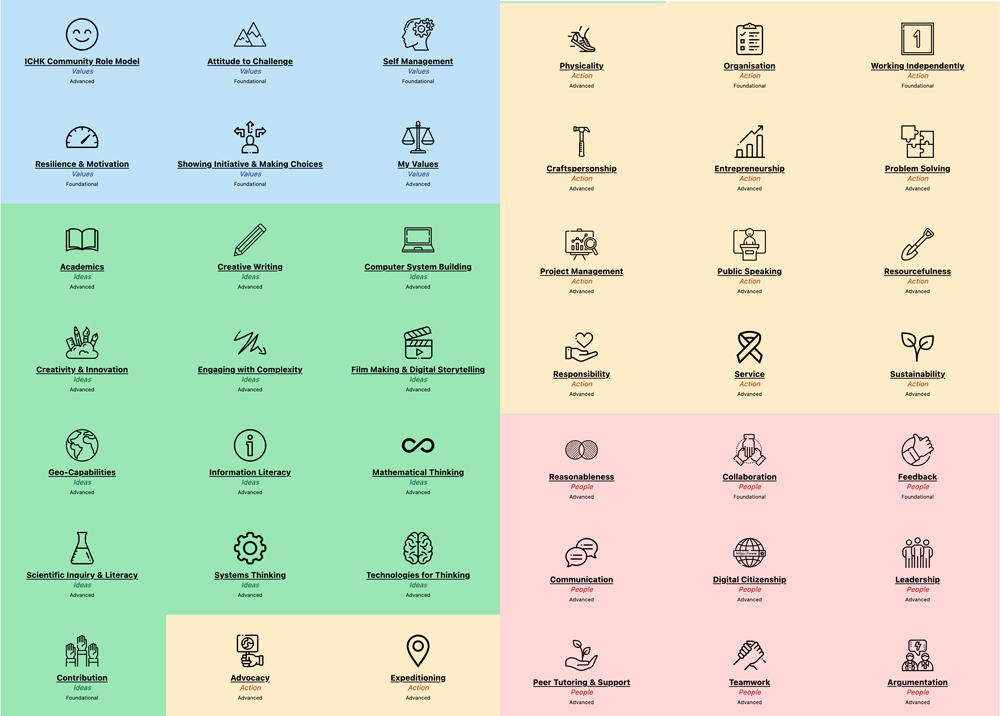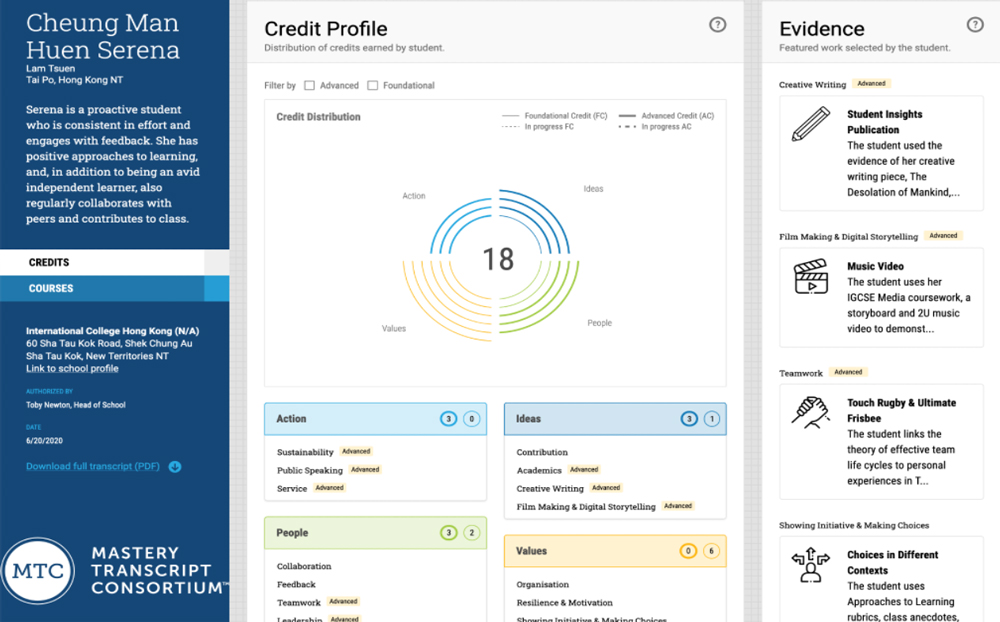
International College Hong Kong (ICHK) is a school in which there are no grades for our younger students, and in which fear of exams is not used as a motivational stick with our older students. It is an academically non-selective school in which all students are accepted and supported, a school with a dedicated unit for students with pronounced needs. It is a school with three full-time outdoor educators, promoting a culture whereby learning often means getting outdoors. And yes, it is also a school that typically delivers International Baccalaureate (IB) diploma results four to five points above the global average.
That last point is important, we know. Indeed, not just important, but vital because no matter what other responsibilities a school might assume, preeminent among them is the need to furnish students with the qualifications needed to gain access to the next phase of their education, at the optimal levels of which they are capable.
And therein lies a pivotal source of tension, one we have long recognized and whose ultimate resolution we are still working towards. In conditions created by the fourth industrial revolution, it is assumed that students will attend university. As a result, everything we do as a school is ultimately constrained by the requirements of tertiary admission, and our implicit pledge to parents is to do our best to get students into the university that they wish to attend. And whilst we deliver amply on this promise, the act of doing so requires us to stretch the fabric of our school in ways we might otherwise avoid, using energy we could usefully expend elsewhere.
It is for these reasons that we were so excited by the opportunity to work with the Mastery Transcript Consortium (MTC), a group that we joined four years ago. Founded by a forward-thinking group of independent schools, the MTC seeks to replace the traditional grade-based transcript offered by US high schools with something much more nuanced, more balanced, and more amenable to innovation, wellbeing, and growth. The Mastery Transcript is designed to be grade-free, non-standardized across schools, and to be readable within two-minutes by admissions officers. It is a breath of fresh air in a hyper-competitive age that seems obsessed with standardized tests, numeric analysis, and coming top of the rankings.
The MTC provides a robust training program for schools looking to get on board, supporting what can be a challenging period of learning for key staff. In undertaking this training, we came to define a graduate profile for our school, to conceive of learning as spanning four interconnected domains, and ultimately to create a set of 42 credits which ICHK students can work to master. Given the MTC’s commitment to eschewing standardization across schools, transcripts are embedded in and speak to the culture of each issuing institution. As can be seen in the image below, our domains cover a broad spectrum of skills, concepts, and attributes, the likes of which conventional education is rarely able to shine a light upon:

ICHK’s credit listing, comprising 42 credits over four domains. (Photo source: Ross Parker)
Students starting Year 10 at ICHK Secondary are offered the opportunity to begin working on the Mastery Transcript, and those opting to do so use our school’s Gibbon platform to browse the available credits before enrolling in their first credit with a mentor. The role of the mentor is to guide the student towards undertaking experiences and compiling evidence that demonstrates mastery in their chosen credit. The back-and-forth process between student and mentor results not only in evidence but also in the kind of deep, genuine, and reflective learning that comes from the collaborative besting of a challenge that seems to lie just out of reach.
The Mastery Transcript records and communicates student growth, achievement, and distinction in all their myriad forms and on students’ own terms. Students devise and closely consider the quality and sustainability of their own educational program, evidence of which is offered to universities and employers by virtue of their completed transcript. As such, the Transcript is highly empowering to students, who are encouraged to view their school experience as a complex of self-regulated encounters with learning across a comprehensive range of activities.
Students’ interests, strengths, ambitions, and achievements, whether these be intellectual, practical, or social, have to be made visible via the digitalized mechanisms that combine to create the Transcript. These mechanisms allow a reader immediate access to further evidence, presented across a range of forms.
In gathering evidence, students spell out and reflect on what they believe in, what they stand for, how they think, what they do, and the ways in which they relate to others. It is a process that results not just in the successful completion of a Mastery Transcript, but equally in the all-around personal growth that any ambitious school seeks to promote in its students.
Over the span of four years, students work with a range of different mentors, aiming to gradually accumulate nine foundational credits and an additional number of advanced credits. During this time, they continue with their regular studies, including the General Certificate of Secondary Education (GCSEs) and Business and Technology Education Council (BTECs) in Years 10 and 11, and the IB Diploma in Years 12 and 13. In order to ensure that there is sufficient time for students to engage in a broad diet of experiences, we have reduced the number of GCSE and BTEC subjects that students study from eleven to seven, also allowing us to innovate in other significant ways.
Each year, we have a number of students graduating with the Mastery Transcript, with each individual transcript telling an altogether fuller and more comprehensive story of student achievement and providing an overall impression of a graduating student that is richer, deeper, and, in every instance, truly unique. These students take with them a unique and shareable code which gives recipients access to their digital transcript.

Screenshot of a live student transcript, displaying 18 credits earned, as well as selected evidence. (Photo source: Ross Parker)
As intended, the transcript really does offer a two-minute read for those who need it, but also the ability to click through into a wealth of evidence should a closer look be required.
In partnering with the MTC, we have learned an incredible amount in a very short time, working closely with their team to fit their work into the international context. In 2020, we became one of the first five schools worldwide to graduate students with a Mastery Transcript and we have graduated further students each successive year. In each case, various audiences have been impressed by and appreciative of the qualities that our students have been able to capture via their transcripts, which would otherwise go unreported, unrecognized, and unvalued.
Of late, as they continue to develop in their own right, we’ve been in discussion with the MTC regarding their move to actively restrict the Mastery Transcript to only those students who do not receive some other grade-based transcript from their school. While this decision limits the number of ICHK students eligible to earn a Mastery Transcript, we understand the philosophical and values-based thinking behind the move and fully support the MTC’s bid to up the ante in terms of the transcript’s exclusive currency. Meanwhile, appreciating the conflict that they are introducing for some schools, the MTC has created an additional pathway, the Mastery Learning Record, which retains the possibility for IB diploma students to work in the mastery domain, earn credits, and have a digital record. Thus, the concept of wider holistic accomplishment continues to be available as an adjunct to academic success.
Ideally, over time, as the Mastery Transcript becomes one of many creative pathways to university admission, we will witness the educational mainstream being weaned off its costly and increasingly anachronous reliance on grades, allowing the school system to recognize and develop a much wider and more inspiring set of human achievements.
--------------------------------------------------------------
Ross Parker is the director of technology and assessment at ICHK Secondary, which is located in the rural northeast of Hong Kong’s New Territories.